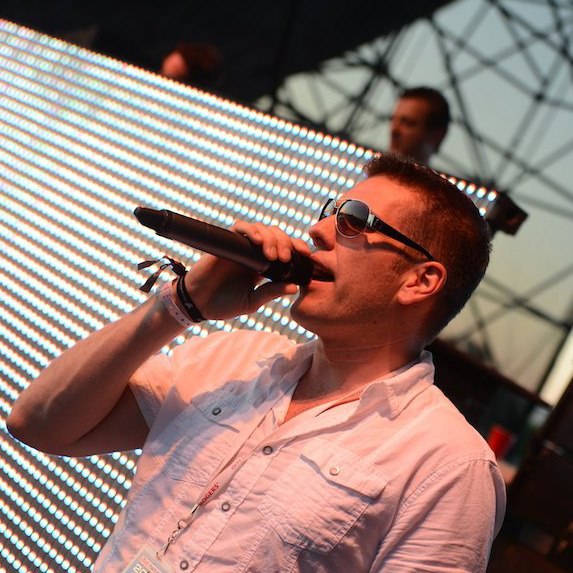'YOU'RE ONLY AS GOOD AS YOUR WORD.
BURNING BRIDGES WITH ARTISTS, AGENTS OR THE PUBLIC WILL HAUNT YOU FOREVER.'
- Ryan Kruger
With a career spanning over 20 years. Ryan Kruger is the poster boy for our growing electronic music scene in Toronto. Starting Destiny in 1993 he cultivated a strong events company that is highly respected in Toronto and abroad. Between running Destiny and being a managing director at the alpha omega, Electronic Nation Canada, he took a minute to let us pick his brain about the infamous Tornado at WEMF to some of his favourite experiences over the years.
D: What made you decide to start Destiny Events?
RK: I started attending raves as a patron early on in the Toronto rave scene. It was around 1991 and it was literally the first year they existed. I quickly realized I had a connection to the music and the scene like nothing else I had experienced to that point in my life. Within that first year I was helping promote and then partnered on a series of events called Mayhem and then founded Destiny in 1993 with the help of a few other promoters in the city. Being a promoter seemed like a natural fit and still does today.
D: During Destiny's earlier years, what were some roadblocks that occurred i.e. booking the venue, booking artists or promoting it?
RK: Venues were always the biggest issue. While there were no lack of empty warehouses and film studios in and around Toronto at the time, we were just kids with no experience in real estate. Trying to convince building owners to do what we wanted to do was always a bit of a challenge and it didn’t help that doing events in these types of rooms fell into a legal grey zone where various authorities could shut you down for any number of reasons. Luckily, by-law officers rarely worked late or on weekends and because we didn’t sell alcohol, the police pretty much left us alone. Over the course of those first few years, we learned that negotiation skills would get us the buildings we wanted and avoid us from being targeted by the various agencies that could cause us problems. Artists and promotion were not really issues in the early days. All the DJs were local and without the web even existing at that time, all promo was hand to hand flyers and a physical mailing list. While labour intensive, it wasn’t rocket science!
D: How did WEMF come to fruition? Who were the main coordinators behind the event?
RK: We decided to do WEMF based on the stories we were hearing about multi-day festivals in Europe. Reading about the Mayday festival in Mixmag was the actual inspiration if I recall. Nobody had done anything like it in Canada before and we wanted to try something new. It was 1995 and we built it as our Destiny 2 year anniversary event. We pretty much did it on our own although we did work with a promoter out of the UK called the Outer Limits to help book talent.
D: In 1995, a tornado ripped through WEMF at Mosport International Raceway. How did you deal with the aftermath and what skills did you possess that helped you deal with that occurrence?
RK: While a complete disaster when it happened it was actually a blessing in disguise. It was Friday night when it rolled in and flattened the 3 circus tents we had up as well as smashing all the sound and lights into the ground from those 3 stages . Luckily I was able to convince the sound company to cobble together enough gear to build one big main stage on Saturday morning and continue the party. When word got out that we had been hit by a tornado but were still going it was all over the media – especially the dance radio station and people streamed in all day Saturday. Had this not happened the event would likely disappeared into history as just another event that lost money. 20 years later, I still get asked about it all the time. Skill wise it was a great example of how to manage under pressure and turn adversity into advantage.
D: You've produced over 600 events at Destiny. What are some of the most memorable experiences you've had over these 21 years?
RK: WEMF festivals were always the most challenging and the most rewarding events I did until joining Live Nation 3 years ago and creating Digital Dreams. We tried to move WEMF every year – sometimes by choice and other times after being chased out of town by an angry mob who we kept awake for 3 days. Building a small city in a new location each year made it interesting to say the least. It was also great experience for almost every facet of business I was involved in over my life. Whether it was transporting 10,000 people to and from Christian Island on a flotilla of water craft or dealing with town councils across Ontario there was never a dull moment.

D: Destiny is known for building strong relationships with artists. How important do you think that is in operating a successful promotions company?
RK: The entertainment industry is based on relationships. It is still a place where you are only as good as your word and burning bridges with artists, agents or the public will haunt you forever. With artists, we always worked very hard not only to provide a great event experience but also get to know them as people where possible. As an artist, you want to feel comfortable when you travel and playing for a friend is always better than a stranger.
D: What are some of the differences you've noticed with respect to the 'EDM Boom' as opposed to the underground style in the early 90s?
RK: Our goal was always to bring electronic dance music to the masses. Now that this has actually happened it’s not only a great feeling of accomplishment but also a safety mechanism for our industry. When everything was underground it was easier for tastes to change and the industry to lose relevance which it did, in North America through the mid 2000’s. As a mainstream force, it becomes another major genre that is self-perpetuating due to the critical mass of people attending events, creating music, promoting events and everything else that goes into a vibrant scene. The “EDM” boom is simply the gateway for many people to enter dance music who might not otherwise experience the sound, or be turned off by the 'underground nature' of the scene. From the gateway people can then become more educated about the various genres and styles but without the gateway there are no next steps!
D: Where do you see Destiny going in the next 21 years? (since it will obviously still be around!)
RK: We will continue to produce the kind of events that people want to attend. Musical tastes and genres will continue to evolve and we will be right there with them. When electronic music runs in your veins for this long it’s unlikely it will ever go away!
D: You also run Electronic Nation as a managing director. How has your experience and Destiny helped you in this position?
RK: If I had not built my promoter skills or enjoyed working as an independent for so many years I would not be here today. Live Nation is the largest concert promoter in the world and as such has the ability to work with and employ people who have proven their abilities in the industry. Hard work and dedication got me here and I continue to use the skills and relationships I've developed over those many years on a daily basis.
D: If you weren't in the music industry, what would you be doing as a career?
RK: I did my MBA in marketing so likely somewhere within that field.
D: Who have been some of your favourite acts booked and why?
RK: You could look at this from two sides. First there are people who I consider friends and who I go back with for many years. People like Andy C, Ed Rush & Optical, Christopher Lawrence and others who I always enjoy not only hearing but also spending time with outside the event. On the other hand, there are artists who I either spent many years wanting to work with and now do or are personal favourites when I listen to music. These include Tiesto, Eric Prydz, Danny Tenaglia, Luciano, Justice and many others. Bottom line here is that since I curate the festival you can look up and down the Digital Dreams line-up and it will give you a pretty good indication of what I like.
D: What are your favourite events to throw and why?
RK: I love them all and try to make each and every one the best it can be. If you sell fun for a living why wouldn’t you?


